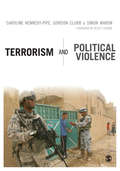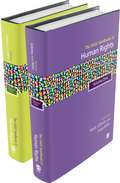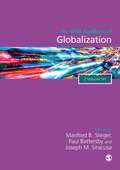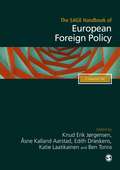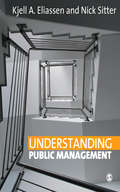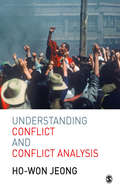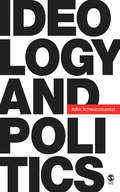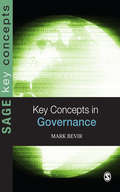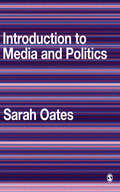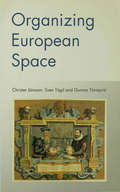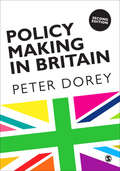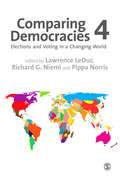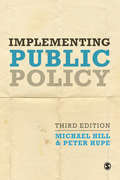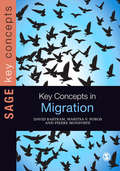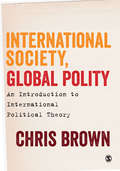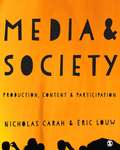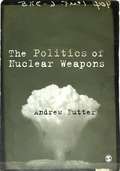- Table View
- List View
Terrorism and Political Violence
by Caroline Kennedy-Pipe Gordon Clubb Simon MabonThis book introduces you to the key issues in contemporary studies on Terrorism. Its interdisciplinary approach provides a unique intellectual rigour which introduces readers to cutting-edge research. Bringing together chapters contributed by members of the Terrorism and Political Violence Association network, it offers an insight into a variety of traditional and critical perspectives. It also equips Undergraduate and Postgraduate students with the study skills needed to succeed in coursework and assignments, especially dissertation work. Drawing on the expertise of TAPVA members, this book: Explores contemporary issues, such as drone warfare, state violence, children and political violence, cyber-terrorism and de-radicalisation. Features case studies drawn from a range of international examples, lists of further reading, key concepts and questions for use in seminars and private study. Provides you with study skills content designed to help you complete your dissertation. This is the perfect textbook to guide you through your studies in terrorism, political violence, international security and strategic studies.
Urban Regeneration
by Professor Peter Roberts Sir Hugh Sykes Rachel GrangerUrban Regeneration is widely discussed but less widely understood. Fully revised with important new policy, case studies and international analysis, the Second Edition of Urban Regeneration will correct that. The 16 chapters, written by leading experts, are organised into four sections: The Context for Urban Regeneration: The history and evolution Major Themes and Topics: Including Housing, Community, Employment and the Environment Key Issues in Managing Urban Regeneration: Including Legal and Organisational considerations Experience Elsewhere and a View of the Future: Expanded section now discussing Australia and the Celtic Fringe as well as Europe and the USA This is the essential handbook for practitioners involved in regeneration, as well as students of planning, urban studies, geography and architecture.
The SAGE Handbook of Human Rights: Two Volume Set
by Anja Mihr Mark GibneyThe SAGE Handbook of Human Rights will comprise a two volume set consisting of more than 50 original chapters that clarify and analyze human rights issues of both contemporary and future importance. The Handbook will take an inter-disciplinary approach, combining work in such traditional fields as law, political science and philosophy with such non-traditional subjects as climate change, demography, economics, geography, urban studies, mass communication, and business and marketing. In addition, one of the aspects of mainstreaming is the manner in which human rights has come to play a prominent role in popular culture, and there will be a section on human rights in art, film, music and literature. Not only will the Handbook provide a state of the art analysis of the discipline that addresses the history and development of human rights standards and its movements, mechanisms and institutions, but it will seek to go beyond this and produce a book that will help lead to prospective thinking.
The SAGE Handbook of Globalization
by Professor Manfred B. Steger Paul Battersby Professor Joseph M SiracusaGlobal studies is a fresh and dynamic discipline area that promises to reinvigorate undergraduate and postgraduate education in the social sciences and humanities. In the Australian context, the interdisciplinary pedagogy that defines global studies is gaining wider acceptance as a coherent and necessary approach to the study of global change. Through the Global Studies Consortium (GSC), this new discipline is forming around an impressive body of international scholars who define their expertise in global terms. The GSC paves the way for the expansion of global studies programs internationally and for the development of teaching and research collaboration on a global scale. Mark Juergensmeyer and Helmut Anheier’s forthcoming Encyclopaedia of Global Studies with SAGE is evidence of this growing international collaboration, while the work of Professor Manfred Steger exemplifies the flourishing academic literature on globalization. RMIT University’s Global Cities Institute represents a substantial institutional investment in interdisciplinary research into the social and environmental implications of globalization in which it leads the way internationally. Given these developments, the time is right for a book series that draws together diverse scholarship in global studies. This Handbook allows for extended treatment of critical issues that are of major interest to researchers and students in this emerging field. The topics covered speak to an interdisciplinary approach to the study of global issues that reaches well beyond the confines of international relations and political science to encompass sociology, anthropology, history, media and cultural studies, economics and governance, environmental sustainability, international law and criminal justice. Specially commissioned chapters explore diverse subjects from a global vantage point and all deliberately cohere around core “global” concerns of narrative, praxis, space and place. This integrated approach sets the Handbook apart from its competitors and distinguishes Global Studies as the most equipped academic discipline with which to address the scope and pace of global change in the 21st century.
The SAGE Handbook of European Foreign Policy
by Professor Ben Tonra Dr Katie Laatikainen Professor Edith Drieskens Knud Erik Jorgensen Ms Aasne Kalland AarstadDuring the last two decades the study of European foreign policy has experienced remarkable growth, presumably reflecting a more significant international role of the European Union. The Union has significantly expanded its policy portfolio and though empty symbolic politics still exists, the Union’s international relations have become more substantial and its foreign policy more focused. European foreign policy has become a dynamic policy area, being adapted to changing challenges and environments, such as the Arab Spring, new emerging economies/powers; the crisis of multilateralism and much more. The SAGE Handbook of European Foreign Policy, Two-Volume set, is a major reference work for Foreign Policy Programmes around the world. The Handbook is designed to be accessible to graduate and postgraduate students in a wide variety of disciplines across the humanities and social sciences. Both volumes are structured to address areas of critical concern to scholars at the cutting edge of all major dimensions of foreign policy. The volumes are composed of original chapters written specifically to the following themes: · Research traditions and historical experience · Theoretical perspectives · EU actors · State actors · Societal actors · The politics of European foreign policy · Bilateral relations · Relations with multilateral institutions · Individual policies · Transnational challenges The Handbook will be an essential reference for both advanced students and scholars.
Understanding Public Management
by Kjell A Eliassen Nick Sitter'A broad-ranging and highly intelligent account of key recent developments internationally which skillfully updates the public management and governance literatures' - Ewan Ferlie, Royal Holloway 'Public management has been radically changed and reformed... this book gives students a fine introduction to these changes and to the theories dealing with them' - Jørgen Grønnegaard Christensen, University of Aarhus An introduction and guide to the dramatic changes that have occurred in the provision of public services over the last two decades, this book combines theoretical perspectives with a range of case studies from Europe, North America and further afield to explain why, how and with what success liberal democracies have reformed the service role of the state. The book pays close attention to four major dimensions of this transition: " External challenges and opportunties: globalisation and EU integration " Reducing the role of the state: Liberalisation, privatisation, regulation and competition policy " Improving the role of the state: New Public Management, e-Government and beyond " Managing the New Public Sector: organisations, strategy and leadership This text is designed for undergraduate courses in public governance, but it also addresses the core components of MPA programmes - the parameters, tools, principles and theories of public sector reform.
Understanding Conflict and Conflict Analysis
by Ho-Won Jeong'...effectively fills a long-standing void and will no doubt be hailed as a much-needed new addition to the literature... This text very much exemplifies the strength of Ho-Won Jeong as a theorist and one of the more prolific writers in the larger peace and conflict studies field... the final three chapters on 'De-escalation Dynamics' (which includes a brief section on third party intervention), on 'Conciliation Strategies,' and especially the one on 'Ending Conflict,' which provides a range of outcomes beyond the usual focus on third party intervention (read mediation) epitomizes the value of this new text' - Journal of Peace Research '...an awesome tour d'horizon of modern war, violence, and confrontation within and between nations. Illustrating via just about every conflict in every corner of the world, the author invokes an endless array of insights and interpretations, ranging from the micro to the macro, beautifully written in a seamless sequence of closely linked and discursive essays.' - Professor J. David Singer, University of Michigan 'Ho-Won Jeong has written an illuminatinbg analysis of the dynamics of conflict. He lays out the tools we have to analyze conflict in a literate and comprehensive way. A valuable book for anyone interested in a more comprehensive understanding of conflict, its sources, and its deescalation and termination' - Janice Gross Stein, Belzberg Professor of Conflict Management, Director, Munk Centre for International Studies, University of Toronto 'Jeong has successfully combined behavioral and structural analysis of the dynamics of social conflict. This volume covers the multiple dimensions - escalation, entrapment, de-escalation, termination, and resolution - both of violent and non-violent confrontation between adversaries, as well as the utility and limitations of external intervention. For students of the social sciences, it should serve as an excellent introduction to the complex realities of social conflict.' - Milton Esman, John S. Knight Professor of International Studies, Emeritus, Cornell University By examining the dynamic forces which shape and re-shape major conflicts, this timely book provides students with the knowledge base needed to successfully study conflict sources, processes and transformations. Broad in focus, it addresses the multiple social, political and psychological features central to understanding conflict situations and behaviour. A range of both recent and historical examples (including the Arab-Israeli conflict, the 'War on Terrorism', the Cold War, and the civil wars in Sudan, former Yugoslavia and Sri Lanka) are discussed, illustrating the application of concepts and theories essential to the analysis of inter-group, inter-state and intra-state conflict and conflict resolution in a wider context. Understanding Conflict and Conflict Analysis is key reading for students of international relations, peace and conflict studies, conflict resolution, international security and international law.
Ideology and Politics
by Dr John J Schwarzmantel'Successfully challenges the notion that we live in a post-ideological age. John Schwarzmantel searchingly questions the thesis that only single issues and identities matter, providing a reliable compass to help students navigate through a world that has witnessed the death of Communism and the rise of neo-liberal hegemony' - Jules Townshend, Professor of Political Theory, Manchester Metropolitan University This book challenges the idea of post-ideological consensus and offers a fresh perspective on the current state of political ideologies. With 'traditional' political ideologies, such as liberalism, socialism, nationalism and conservatism, perceived to be in crisis, it assesses: - Their continued relevance in the context of globalisation and of scepticism towards ideological thinking - The challenges posed by 'new' ideologies such as ecologism and feminism - The implications of new social movements and ideas of community and multiculturalism for the traditional Left-Right political framework. Ideology and Politics presents an accessible account of a new era of ideological politics, where the dominant neo-liberalism has spawned a diverse global range of 'ideologies of opposition'. It situates these radical frameworks of change and protest in relation to more traditional 'anti' ideologies and seeks to re-establish the relevance of ideologies for political action in the contemporary world. This text will be core reading for students of politics at advanced undergraduate and postgraduate level.
Key Concepts in Governance (SAGE Key Concepts series)
by Mark Bevir'A comprehensive, multidisciplinary examination of the concepts embodied in governance and their wide-ranging applications and implications. An important read and reference for students and academics in the social sciences, particularly those engaged in public policy studies' - Professor Carolyn J. Heinrich, University of Wisconsin-Madison 'An authoritative short survey for which students and teachers alike will be profoundly grateful' - Professor Rod Rhodes, University of Tasmania and Australian National University 'Students of governance will welcome this book given the explosion of literature in the field. It provides a quick guide to key concepts and ideas but does so with considerable originality. We are offered not just a review of well-established positions but a distinctive take on the governance debate' - Gerry Stoker, Professor of Governance, University of Southampton The language of governance has risen to prominence in the last 20 years as a way of describing and explaining changes in the nature and role of the state, but the concepts involved can be confusing as they are often new and come from diverse disciplinary and theoretical settings. Key Concepts in Governance provides a clear introduction to the technical concepts and policies of contemporary governance through short definitional essays. Each entry features: " a snapshot definition of the concept " a contextualization of the concept " an overview of relevant debates " a guide to further reading. The book also includes a substantial introductory chapter which gives an overview of governance studies as a whole, orientating and guiding the reader around the issues that the concepts address. Highly readable, with clear cross-referencing, this is an ideal book for students on introductory courses and an indispensable resource for anyone interested in governance.
Globalization and Inequalities: Complexity and Contested Modernities
by Sylvia WalbyHow has globalization changed social inequality? Why do Americans die younger than Europeans, despite larger incomes? Is there an alternative to neoliberalism? Who are the champions of social democracy? Why are some countries more violent than others? In this groundbreaking book, Sylvia Walby examines the many changing forms of social inequality and their intersectionalities at both country and global levels. She shows how the contest between different modernities and conceptions of progress shape the present and future. The book re-thinks the nature of economy, polity, civil society and violence. It places globalization and inequalities at the centre of an innovative new understanding of modernity and progress and demonstrates the power of these theoretical reformulations in practice, drawing on global data and in-depth analysis of the US and EU. Walby analyses the tensions between the different forces that are shaping global futures. She examines the regulation and deregulation of employment and welfare; domestic and public gender regimes; secular and religious polities; path dependent trajectories and global political waves; and global inequalities and human rights.
Introduction to Media and Politics
by Sarah Oates'...a lively introduction to media and politics, with timely chapters on the media, war and terrorism and the internet. If you want to know why media matters in politics this is a great place to start' - Dr Margaret Scammell, London School of Economics and Political Science 'This book has the truly international perspective that helps to put politics and media in the context of current world events...a unique and valuable text' - Professor Lynda Lee Kaid, University of Florida '...a new and promising perspective to the study of media and politics in a comparative dimension' - Professor Paolo Mancini, Università di Perugia Introduction to Media and Politics draws together evidence from the United States, the United Kingdom, Russia and beyond to provide students with an understanding of the relationship between the media and the political sphere. This highly accessible text: - balances theory with case studies on elections, war, terrorism, and the emerging role of the Internet, enabling the reader to think critically about how the media should work in the service of democracy. - places the study of media and politics in a comparative perspective, allowing the reader to consider how the same media institutions - including commercial and public service broadcasting, paid political advertising, and war coverage - function in different countries. This text is essential reading for advanced undergraduate and postgraduate students of media and politics.
Organizing European Space
by Christer Jonsson Sven Tagil Gunnar TornqvistThis book combines perspectives from political science, history and geography to provide a comprehensive introduction to `Europe' or European space as we understand it today. Central to the book is the phenomenon of the sovereign state and the question of alternative ways of organizing Europe politically and economically. The book explores four different ways of organizing space: state, union, region and network. By tracing the origins of the sovereign state in Europe, the book first reviews the resilience and adaptability of the sovereign state historically, and then looks at the implications of the contradictory processes of integration and fragmentation, or globalization and regionalization, present today. A key concept developed throughout the book is that of networks, especially with respect to the European Union, and the relationship between regions, networks and cities, a relationship long traditional to Europe's political organization. The authors review critically popular notions of a 'Europe of regions' or 'the end of the sovereign state' and instead serve to combine their different disciplinary conceptual tools and perspectives to provide new insights into the future organization of European space. Organizing European Space will be essential reading for all students of contemporary Europe seeking a deeper understanding of the modern state and the complexity of changing notions of identity, political organization and territoriality inherent in Europe in the past, present and future.
Policy Making in Britain: An Introduction
by Peter DoreyIntroducing you to the public policy making process in Britain today, this book adopts an empirical approach to the study of policy making by relating theory to actual developments in Britain since the 1980s. It covers: Ideas, Problem Definition, Issues and Agenda-Setting Key Individuals Key Institutions Parliament and Public Policy Implementation The shift from Government to Governance (including marketization, and devolution) The increasing role of the private and voluntary sectors in policy delivery Internationalisation and Europeanization of policies and policy making Evaluation, audits and the New Public Management Each chapter is enriched by recent real-life case studies and boxes illustrating key arguments, concepts and empirical developments. Taking into account the 2010 election and beyond, the book addresses current issues, developments and debates. The result is a contemporary and engaging text that will be required reading for all students of British politics, public policy and public administration.
Comparing Democracies (Third Edition): Elections and Voting in a Changing World
by Pippa Norris Richard G. Niemi Lawrence LeducThe benchmark first and second editions of Comparing Democracies represented essential guides to the global study of elections. Reflecting recent developments in the field, this timely third edition gives an indispensable state-of-the art review of the whole field from the world's leading international scholars. With a completely new thematic introduction which explores how democracy is built and sustained, thoroughly updated chapters (many of which are also new) , the third edition provides a theoretical and comparative understanding of the major topics related to elections and introduces important work on key new areas. Comparing Democracies, third edition will remain a must-read for students and lecturers of elections and voting behaviour, comparative politics, parties, and democracy. Contents: Introduction: Building and Sustaining Democracy Lawrence LeDuc, Richard G. Niemi, and Pippa Norris PART I: ELECTORAL INSTITUTIONS AND PROCESSES Electoral Systems and Election Management Elisabeth Carter and David M. Farrell Political Parties and Party Systems Susan E. Scarrow Party and Campaign Finance Ingrid van Biezen Election Campaigns Christopher Wlezien Campaign Communications and Media Claes H. de Vreese PART II: PUBLIC OPINION AND VOTING Ideology, Partisanship and Democratic Development Russell J. Dalton Political Participation André Blais Elections and the Economy Timothy Hellwig Women and Elections Marian Sawer Conclusion The Consequences of Elections G. Bingham Powell
Implementing Public Policy: An Introduction to the Study of Operational Governance
by Michael Hill Dr Peter HupeBuilding on the success of the previous two editions, this book provides students with an exemplary overview of the theory and practice of public policy implementation and how it relates to contemporary public management. In doing so, this new edition makes use of more illustrative examples, delves further into researching implementation and explores issues about the relationship between policy formulation and implementation in greater depth. Written for an international audience, this is essential reading for upper-level undergraduate and graduate students studying or conducting research in public policy, social policy, public management, public administration and governance.
Key Concepts in Migration (SAGE Key Concepts series)
by David Bartram Pierre Monforte Maritsa Poros"Demonstrates that the study of international migration has really come of age. From acculturation to undocumented immigration, the authors consider more than three dozen concepts at the heart of migration studies. Clearly written in a highly readable style, the book is a valuable resource for students and scholars alike." - Nancy Foner, City University of New York "This very useful and authoritative compendium explicates thirty-eight concepts central to analysis of international migration. It is accessible to undergraduate students and even can enrich graduate courses. It nicely complements books like The Age of Migration or Exceptional People. Concision is a virtue!" - Mark J. Miller, University of Delaware "An essential introduction to migration that is international in scope and rigorous in its attention to the scholars, nuances and debates in the field." - Maggie O'Neill, Durham University This book provides lucid and intuitive explanations of the most important migration concepts as used in classrooms, among policymakers, and in popular and academic discourse. Arguing that there is a clear need for a better public understanding of migration, it sets out to clarify the field by exploring relevant concepts in a direct and engaging way. Each concept: Includes an easy to understand definition Provides real-world examples Gives suggestions for further reading Is carefully cross-referenced to other related concepts It is an ideal resource for undergraduate and post-graduate students studying migration in sociology, politics, development and throughout the social sciences, as well as scholars in the field and practitioners in governmental and non-governmental organizations.
The SAGE Handbook of Globalization
by Joseph M. Siracusa Manfred B. Steger Paul BattersbyGlobal studies is a fresh and dynamic discipline area that promises to reinvigorate undergraduate and postgraduate education in the social sciences and humanities. In the Australian context, the interdisciplinary pedagogy that defines global studies is gaining wider acceptance as a coherent and necessary approach to the study of global change. Through the Global Studies Consortium (GSC), this new discipline is forming around an impressive body of international scholars who define their expertise in global terms. The GSC paves the way for the expansion of global studies programs internationally and for the development of teaching and research collaboration on a global scale. Mark Juergensmeyer and Helmut Anheier's forthcoming Encyclopaedia of Global Studies with SAGE is evidence of this growing international collaboration, while the work of Professor Manfred Steger exemplifies the flourishing academic literature on globalization. RMIT University's Global Cities Institute represents a substantial institutional investment in interdisciplinary research into the social and environmental implications of globalization in which it leads the way internationally. Given these developments, the time is right for a book series that draws together diverse scholarship in global studies. This Handbook allows for extended treatment of critical issues that are of major interest to researchers and students in this emerging field. The topics covered speak to an interdisciplinary approach to the study of global issues that reaches well beyond the confines of international relations and political science to encompass sociology, anthropology, history, media and cultural studies, economics and governance, environmental sustainability, international law and criminal justice. Specially commissioned chapters explore diverse subjects from a global vantage point and all deliberately cohere around core "global" concerns of narrative, praxis, space and place. This integrated approach sets the Handbook apart from its competitors and distinguishes Global Studies as the most equipped academic discipline with which to address the scope and pace of global change in the 21st century.
Urban Regeneration
by Sir Hugh Sykes Professor Peter Roberts Rachel GrangerUrban Regeneration is widely discussed but less widely understood. Fully revised with important new policy, case studies and international analysis, the Second Edition of Urban Regeneration will correct that. The 16 chapters, written by leading experts, are organised into four sections: The Context for Urban Regeneration: The history and evolution Major Themes and Topics: Including Housing, Community, Employment and the Environment Key Issues in Managing Urban Regeneration: Including Legal and Organisational considerations Experience Elsewhere and a View of the Future: Expanded section now discussing Australia and the Celtic Fringe as well as Europe and the USA This is the essential handbook for practitioners involved in regeneration, as well as students of planning, urban studies, geography and architecture.
International Society, Global Polity: An Introduction to International Political Theory
by Chris BrownThis book provides an overview of the current state of the art in International Political Theory (IPT). It offers a coherent account of the field of IPT, placing both traditional and modern work in a clear and logical framework. The text moves from conventional accounts of the society of states to non-state-centric understandings of global politics. The first part covers international law, war, human rights and humanitarianism. The second part looks at the new human rights regime, the responsibility to protect, the ethics of war and global justice. Each chapter includes annotated reading lists, highlighting directions you can take to further your reading. International Society, Global Polity is perfect for students taking courses on International Political Theory, International Theory, Global Ethics and Global Justice.
Media and Society: Production, Content and Participation
by Nicholas Carah Eric LouwThis book unpacks the role of the media in social, cultural and political contexts and encourages you to reflect on the power relationships that are formed as a result. Structured around the three cornerstones of media studies; production, content and participation, this is an ideal introduction to your studies in media, culture and society. The book: Evaluates recent developments in media production, industries and platforms brought about the emergence of interactive media technologies. Examines the shifting relationship between media production and consumption instigated by the rise of social and mobile media, recasting consumption as 'participation'. Explores the construction of texts and meanings via media representations, consumer culture and popular culture, as well as the relationship between politics and public relations. Assesses the debates around the creative and cultural labour involved in meaning-making. Includes a companion website featuring exercise and discussion questions, links to relevant blogs and web material, lists of further reading and free access to key journal articles.
The SAGE Handbook of Human Rights: Two Volume Set
by Mark Gibney Anja MihrThe SAGE Handbook of Human Rights will comprise a two volume set consisting of more than 50 original chapters that clarify and analyze human rights issues of both contemporary and future importance. The Handbook will take an inter-disciplinary approach, combining work in such traditional fields as law, political science and philosophy with such non-traditional subjects as climate change, demography, economics, geography, urban studies, mass communication, and business and marketing. In addition, one of the aspects of mainstreaming is the manner in which human rights has come to play a prominent role in popular culture, and there will be a section on human rights in art, film, music and literature. Not only will the Handbook provide a state of the art analysis of the discipline that addresses the history and development of human rights standards and its movements, mechanisms and institutions, but it will seek to go beyond this and produce a book that will help lead to prospective thinking.
The SAGE Handbook of European Foreign Policy
by Professor Ben Tonra Dr Katie Laatikainen Professor Edith Drieskens Knud Erik Jorgensen Ms Aasne Kalland AarstadDuring the last two decades the study of European foreign policy has experienced remarkable growth, presumably reflecting a more significant international role of the European Union. The Union has significantly expanded its policy portfolio and though empty symbolic politics still exists, the Union's international relations have become more substantial and its foreign policy more focused. European foreign policy has become a dynamic policy area, being adapted to changing challenges and environments, such as the Arab Spring, new emerging economies/powers; the crisis of multilateralism and much more. The SAGE Handbook of European Foreign Policy, Two-Volume set, is a major reference work for Foreign Policy Programmes around the world. The Handbook is designed to be accessible to graduate and postgraduate students in a wide variety of disciplines across the humanities and social sciences. Both volumes are structured to address areas of critical concern to scholars at the cutting edge of all major dimensions of foreign policy. The volumes are composed of original chapters written specifically to the following themes: · Research traditions and historical experience · Theoretical perspectives · EU actors · State actors · Societal actors · The politics of European foreign policy · Bilateral relations · Relations with multilateral institutions · Individual policies · Transnational challenges The Handbook will be an essential reference for both advanced students and scholars.
The Politics of Nuclear Weapons
by Andrew FutterThis book provides an introduction to political and strategic aspects of nuclear weaponry. It offers an accessible overview of the concept of nuclear weapons, outlines how thinking about these weapons has developed and considers how nuclear threats can continue to be managed in the future. It includes: Coverage of nuclear testing, proliferation, strategy, global actors and disarmament. Analysis of contemporary topics such as nuclear terrorism. A timeline of key nuclear events. Annotated further reading lists helping you to locate sources for essays and assignments. Summaries, study questions and a glossary of key terms Free SAGE journal articles available on the book's webpage. The Politics of Nuclear Weapons is essential reading for both undergraduate and postgraduate students taking courses in Nuclear Politics.
The Politics of Nuclear Weapons
by Andrew FutterThis book provides an introduction to political and strategic aspects of nuclear weaponry. It offers an accessible overview of the concept of nuclear weapons, outlines how thinking about these weapons has developed and considers how nuclear threats can continue to be managed in the future. It includes: Coverage of nuclear testing, proliferation, strategy, global actors and disarmament. Analysis of contemporary topics such as nuclear terrorism. A timeline of key nuclear events. Annotated further reading lists helping you to locate sources for essays and assignments. Summaries, study questions and a glossary of key terms Free SAGE journal articles available on the Resources tab The author will be providing regular updates to his suggested web resources, so be sure to check the Resources tab for the most up-to-date. The Politics of Nuclear Weapons is essential reading for both undergraduate and postgraduate students taking courses in Nuclear Politics.
Terrorism and Political Violence
by Caroline Kennedy-Pipe Gordon Clubb Simon MabonThis book introduces you to the key issues in contemporary studies on Terrorism. Its interdisciplinary approach provides a unique intellectual rigour which introduces readers to cutting-edge research. Bringing together chapters contributed by members of the Terrorism and Political Violence Association network, it offers an insight into a variety of traditional and critical perspectives. It also equips Undergraduate and Postgraduate students with the study skills needed to succeed in coursework and assignments, especially dissertation work. Drawing on the expertise of TAPVA members, this book: Explores contemporary issues, such as drone warfare, state violence, children and political violence, cyber-terrorism and de-radicalisation. Features case studies drawn from a range of international examples, lists of further reading, key concepts and questions for use in seminars and private study. Provides you with study skills content designed to help you complete your dissertation. This is the perfect textbook to guide you through your studies in terrorism, political violence, international security and strategic studies.
